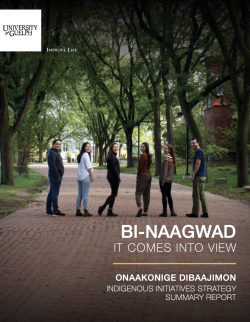Indigenous Initiatives Strategy
Bi-Naagwad | It Comes Into View
Izhichige Min | Our Commitments
The University of Guelph is committed to working towards decolonization and reconciliation with First Nations, Inuit and Métis peoples, communities and lands.
- We seek to inspire future generations of scholars and citizens to reconcile with First Nations, Inuit and Métis peoples and lands
- We believe in the need for equitable access to education, employment and support for First Nations, Inuit and Métis scholars, students and their communities
- We are committed to fostering meaningful partnerships with First Nations, Inuit and Métis Knowledge Holders, communities and organizations
- We are committed to enhancing recognition and respect for Indigenous cultures, languages, and ways of knowing, being and doing
- We are committed to innovative Indigenous research and expanding how we understand and interpret the world
Izhitaw | Our Process
The Indigenous Initiatives Strategic Task Force was established as a working body serving as a subset of the President’s Advisory Committee on Indigenous Initiatives. The mandate of the Task Force was to develop an Indigenous Initiatives Strategy aimed at guiding the advancement of reconciliation and decolonization efforts at the University of Guelph.
Five working groups were formed to review and discuss policies and practices across the themes of governance, campus environment, Indigenous student support, research and scholarship and pedagogy and curriculum. To open the Indigenous Initiatives Strategy Task Force in a good way, Task Force, Advisory Circle and the President's Advisory Committee on Indigenous Initiatives members came together in ceremony on May 31, 2019 at the OAC Centennial Arboretum Centre. The closing ceremony for the Task Force was held virtually on May 6, 2021.
Ngikendamin | What We Learned
Bi-Naagwad, the Indigenous Initiatives Strategy Summary Report outlines the priorities determined by the Working Groups. The full suite of recommendations can be found in the Working Group Final Reports.
The Summary and Working Group Reports were endorsed by the President’s Advisory Committee on Indigenous Initiatives on January 12, 2021 and released on March 4, 2021.
Miigwechiwe Nim | Our Gratitude
We would like to acknowledge and express our gratitude to those who provided guidance to and participated in the Indigenous Initiatives Strategy. Their dedication and commitment are what allow us to move forward on this path of indigenization and reconciliation.
- Advisory Circle
- Steering Committee and Working Group members
- Graduate Research Assistants
- Students, faculty, staff and community members who shared their knowledge and perspectives
- Rene Meshake, Anishinaabe Elder, storyteller and artist for his translation and support in building our word bundles
- Kaitlin Gallant, Indigenous designer, illustrator and beader for her creative work and beautiful illustrations

